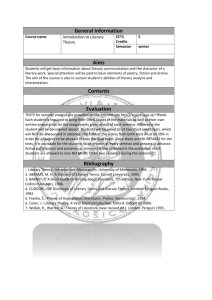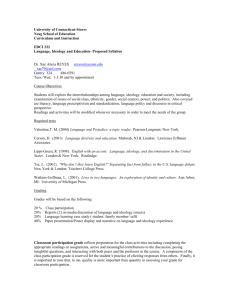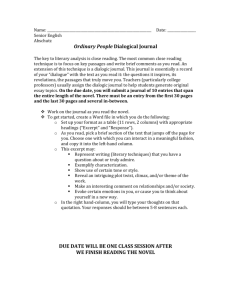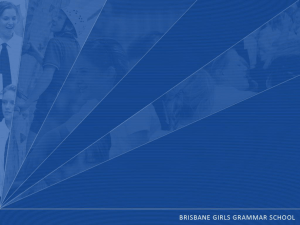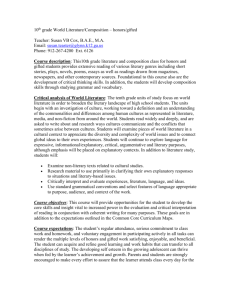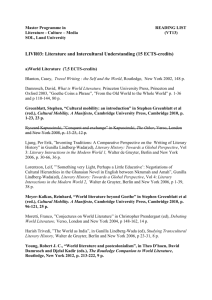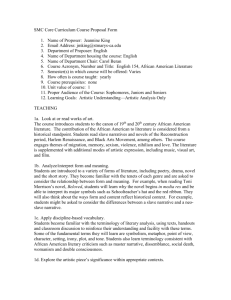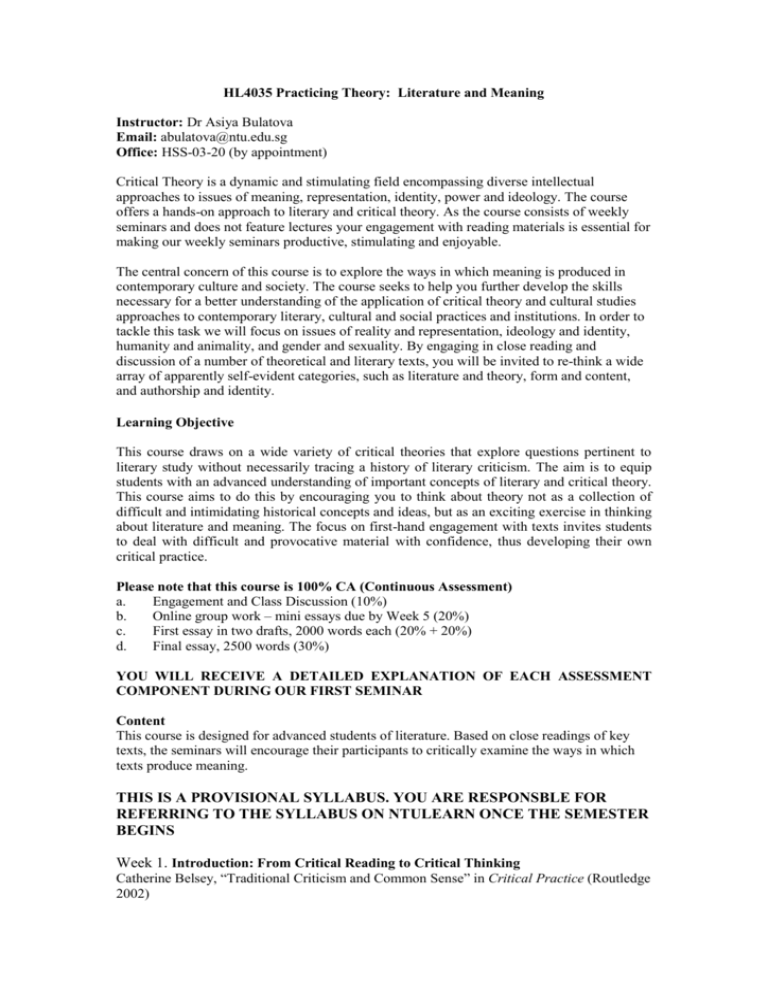
HL4035 Practicing Theory: Literature and Meaning
Instructor: Dr Asiya Bulatova
Email: abulatova@ntu.edu.sg
Office: HSS-03-20 (by appointment)
Critical Theory is a dynamic and stimulating field encompassing diverse intellectual
approaches to issues of meaning, representation, identity, power and ideology. The course
offers a hands-on approach to literary and critical theory. As the course consists of weekly
seminars and does not feature lectures your engagement with reading materials is essential for
making our weekly seminars productive, stimulating and enjoyable.
The central concern of this course is to explore the ways in which meaning is produced in
contemporary culture and society. The course seeks to help you further develop the skills
necessary for a better understanding of the application of critical theory and cultural studies
approaches to contemporary literary, cultural and social practices and institutions. In order to
tackle this task we will focus on issues of reality and representation, ideology and identity,
humanity and animality, and gender and sexuality. By engaging in close reading and
discussion of a number of theoretical and literary texts, you will be invited to re-think a wide
array of apparently self-evident categories, such as literature and theory, form and content,
and authorship and identity.
Learning Objective
This course draws on a wide variety of critical theories that explore questions pertinent to
literary study without necessarily tracing a history of literary criticism. The aim is to equip
students with an advanced understanding of important concepts of literary and critical theory.
This course aims to do this by encouraging you to think about theory not as a collection of
difficult and intimidating historical concepts and ideas, but as an exciting exercise in thinking
about literature and meaning. The focus on first-hand engagement with texts invites students
to deal with difficult and provocative material with confidence, thus developing their own
critical practice.
Please note that this course is 100% CA (Continuous Assessment)
a.
Engagement and Class Discussion (10%)
b.
Online group work – mini essays due by Week 5 (20%)
c.
First essay in two drafts, 2000 words each (20% + 20%)
d.
Final essay, 2500 words (30%)
YOU WILL RECEIVE A DETAILED EXPLANATION OF EACH ASSESSMENT
COMPONENT DURING OUR FIRST SEMINAR
Content
This course is designed for advanced students of literature. Based on close readings of key
texts, the seminars will encourage their participants to critically examine the ways in which
texts produce meaning.
THIS IS A PROVISIONAL SYLLABUS. YOU ARE RESPONSBLE FOR
REFERRING TO THE SYLLABUS ON NTULEARN ONCE THE SEMESTER
BEGINS
Week 1. Introduction: From Critical Reading to Critical Thinking
Catherine Belsey, “Traditional Criticism and Common Sense” in Critical Practice (Routledge
2002)
Excerpt from Joseph Conrad’s Heart of Darkness (Norton Critical Edition)
Week 2. Reality and Representation
Plato, Republic (Penguin Classics 2007), books VI-VII
Excerpt from Aristotle, Poetics (Penguin Classics 1996)
Excerpt from Catherine Belsey, Culture and the Real: Theorizing Cultural Criticism
(Routledge 2004)
Week 3. Language and Meaning 1
Excerpt from Ferdinand de Saussure, Course in General Linguistics (Open Court 1998)
Excerpt from Friedrich Nietzsche, “On Truth and Lying in an Extra-Moral Sense” in Rivkin
and Ryan (eds.), Literary Theory: An Anthology (Blackwell 1998)
Week 4. Language and Meaning 2
Victor Shklovsky, Zoo, or Letters Not about Love (Dalkey Archive Press 2001)
Week 5. Fiction and Originality
Jacques Derrida, “This Strange Institution Called Literature” in Acts of Literature (Routledge
1992)
Jorge Luis Borges, “Pierre Menard, Author of the Quixote” in Labyrinths (New Directions
2007)
Week 6. Ideology and Identity
Karl Marx and Frederick Engels, “Social Being and Consciousness” in The German Ideology
(International Publishers 1970)
Louis Althusser, “Ideology and Ideological State Apparatuses” in Lenin and Philosophy and
Other Essays (Monthly Review Press 2001)
Week 7. The Meaning of “Normal”
Sigmund Freud, “The Sexual Aberrations” in Three Essays on the Theory of Sexuality
(Martino Fine Books 2011)
Week 8. Identity and Sexuality
Judith Butler, “Bodily Inscriptions, Performative Subversions” in
Gender Trouble: Feminism and the Subversion of Identity (Routledge 2006)
Excerpts from Michel Foucault, History of Sexuality, Vol. 1 (Vintage 1990)
Week 9. Humanity and Animality
Carrie Rohman, "The Animal among Others" in Stalking the Subject: Modernism and the
Animal (Columbia UP 2008)
D.H. Lawrence "The Snake" and “Tortoise Shout” in The Poems (Cambridge UP 2013)
Week 10. Popular Culture 1
Theodor Adorno, “Culture industry reconsidered” in The Culture Industry: Selected Essays
on Mass Culture (Routledge 2001)
Art Spiegelman, Maus (Penguin 2003)
Week 11. Popular Culture 2
Pierre Bourdieu, “The Field of Cultural Production” and “The Market of Symbolic Goods” in
The Field of Cultural Production (Polity Press 1993)
Week 12. Meaning and Power
Hillis Miller, “The Critic as Host” in The J. Hillis Miller Reader (Stanford UP 2005)
Henry James, The Turn of the Screw (W. W. Norton & Company 1999)
Week 13. Conclusion: Theory and Literature
Michael Bell, “The Metaphysics of Modernism” in The Cambridge Companion to Modernism
(Cambridge UP 2011)



